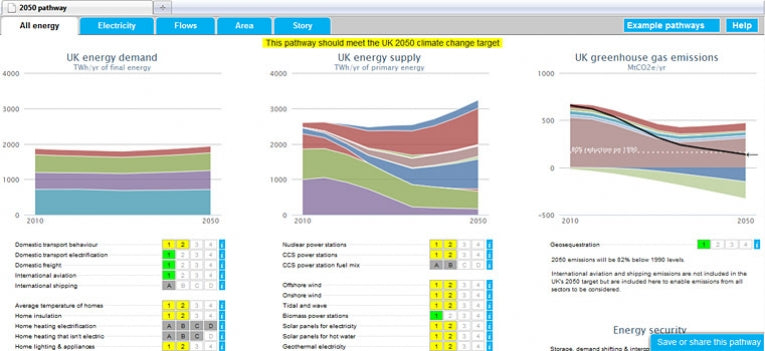Have you ever felt you could make better decisions than the Government? Do you think that Climate Change is not being given sufficient importance in planning? Now you can try to control the UK's carbon emissions to 2050.
And the UK government is listening to you. Last Friday, the UK Department of Energy and Climate Change (DECC) released Pathways to 2050 on their website. It is a piece of software that allows you to reduce British climate emissions by, for example, electrifying the railways or building more wind turbines.
The target, which is legally binding on the British Government, under ground-breaking legislation brought in by the previous Labour Government is to reduce carbon emissions by 80%, which will hopefully keep climate change below the 2° threshold if everyone manages to reach this target globally.
Pathways 2050 is based on the latest scientific knowledge, and was overseen by Professor David MacKay who is well-known as an expert in these matters. He says that this tool is a way for people to have a ''grown-up, energy-literate conversation about the UK's options to 2050.''
The Pathways tool is here.
How does it work? When you start your pathway, you get an easy-to-use control panel which allows you to set the UK energy demand and supply. You can see what is happening on the images at the top of the demand and supply columns - the third column is emissions and this shows how close you are getting to the 80% target. Each ''lever'' - as DECC calls it, has four options, for example on home insulation you can insulate 7 million, 8 million, 18 million or 24 million homes and see how this will affect your emissions. To the right of the lever is an 'i' which opens more information about the options. Other tabs open up electricity, as opposed to all energy; where the energy is going - the 'flow'; the area of the UK you are using for your power; and finally a narrative about how you did your energy reduction - the 'story'.
You will soon find it isn't easy to reach the target. There are a lot of complex decisions to be made and some have greater or lesser effects on the carbon emissions.
DECC have created their own 17 example pathways asked various experts to contribute their own, so you get ones from for example Friends of the Earth and the Energy Technologies Institute, FoE predictably, have no nuclear power in their energy mix, while the ETI has 13 new nuclear power stations, showing that there are many ways to reach the target. You can save or share your particular pathway.
The one area the Pathways software does not cover is the cost: it aims just to give you the technical tools to reduce climate emissions, without burdening you with financial decisions as well.
For the past few days the experts have been discussing how to reduce the emissions on the DECC blog but today is the day the debate is opened to the public. So you can have your say. This is an important contribution to the debate and a good example of how to engage the public in what will be far-reaching decisions on energy and emissions which will affect the future of the UK.
Blog:
Pathways 2050 tool:
http://2050-calculator-tool.decc.gov.uk/










